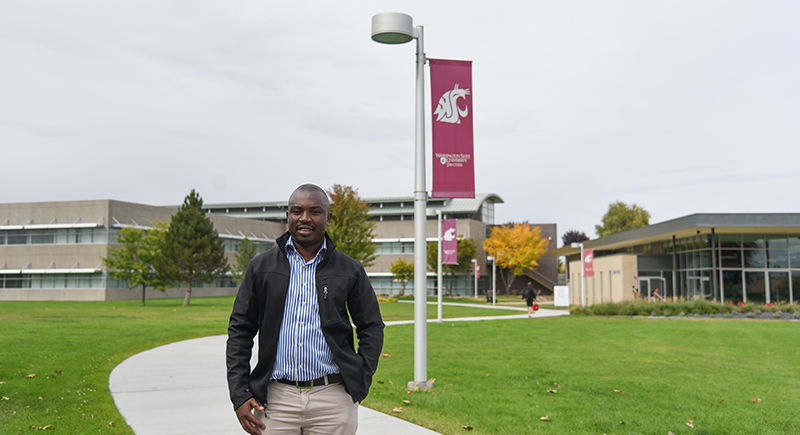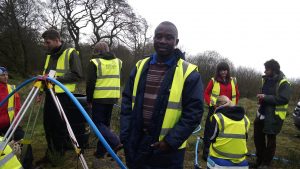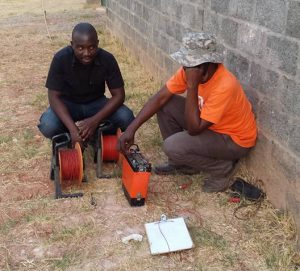
October 19, 2017 Zambian grad student studying solutions to water access, pollution as part of Fulbright at WSU Tri-Cities
By Maegan Murray
In graduate student Kenny Nyirenda’s home country of Zambia, access to clean water sources can be challenging, especially in remote areas.
That is why he has committed his graduate research as a Fulbright scholar at Washington State University Tri-Cities to improving access to clean sources of drinking water and finding solutions to prevent water pollution.
The Fulbright Scholarship allows students and young professionals to undertake international graduate study, advanced research, university teaching and primary and secondary school teaching worldwide. The prestigious program awards approximately 1,900 grants annually in all fields of study and operates in more than 140 countries worldwide.

Kenny Nyirenda completes some work with the UK Groundwater Project.
As part of his Fulbright program, Nyirenda is studying under Yonas Demissie, assistant professor of Civil and Environmental Engineering at WSU Tri-Cities, to look at the impacts of mining on groundwater resources, as well as how climate change is impacting groundwater resources.
“Because of what is happening in terms of climate change and in terms of pollution, people are now resorting to the ground for their water sources,” he said. “Groundwater is often a clean source of water and is readily available in the ground, although it can get depleted and polluted especially by anthropogenic activities.”
Nyirenda said Zambia is largely known for its mining, which puts pressure on water resources as a result of excessive pumping and pollution from the activity.
“We want to make sure that this resource is protected, and many surface water bodies are drying up in some parts of the country due to prolonged dry seasons attributed to climate change,” he said. “There is fresh water available in the ground and we need to make sure we are protecting the resource, especially in these areas that are prone to climatic change.”
Currently, as part of a graduate seminar, he is reviewing the data and literature on the impacts of mining on groundwater in Zambia and around the globe, assessing the potential of acid mine drainage and its impact on groundwater sources.
“What they are mining in Zambia are mainly base metal sulfide-rich mineral deposits, which have the potential to generate acid when exposed to air, moisture or rain water,” he said. “Once that acid is generated, it becomes a nuisance because it spreads into the environment together with the dissolved heavy metals it carries and ends up in groundwater.”
Solving the issue of access to clean drinking water and preventing pollution from occurring within not only his home country, but throughout Africa, he said, could solve many more problems throughout the continent.
“Many diseases that are prevalent in Africa stem from consumption of poor quality drinking water,” he said. “If you sort out the problems with water, you sort out problems with most of Africa. We need to figure out how to protect the resources that we have, as well as improve access to good quality water across Africa.”

Kenny Nyirenda participates in a geophysical survey of groundwater.
Nyirenda said he has never personally suffered from lack of access to clean drinking water, as he grew up in a military barrack where his father served in the military. As a result, he and his family were provided with water and electricity. Across rural parts of Zambia and in other parts of Africa, however, people may not have regular access to the same resources.
“For one, many might not have the knowledge to know whether a water source is OK,” he said. “Additionally, because there are natural sources of pollution, people may collect water thinking that it is of good quality, when in fact, there may be serious issues with it.”
Nyirenda said he plans to take the research he develops through WSU Tri-Cities and inform people, as well as implement changes, in his home country. His home university, The Copperbelt University, was selected by the World Bank as an Africa Center of Excellence in Sustainable Mining. One of its aims is to promote a balance between environmental sustainability and mine production. The pairing of his Fulbright experience at WSU Tri-Cities with the resources afforded to him at his home university will allow him and his colleagues to make a true difference when he arrives back home.
“One of the great things about the Fulbright program is the mutual understanding between the two countries that I can take my work back home to implement positive changes,” he said. “When I go back home, my network here will still be there as a result of this Fulbright experience. My work doesn’t have to end here. We will still be in touch to communicate about developments and regarding new opportunities once I return home.”
Nyirenda hopes to work with the United Nations Environment Programme or United Nations Water to bring about positive change regarding water infrastructure and policies surrounding the resource in his home country. From there, he hopes to become a politician so he can help lead initiatives that will improve access to good quality water.
“Politicians have the opportunity to be more powerful to implement most of these innovative ideas regarding water access and policy,” he said. “I want to use this influence to implement these ideas.”




